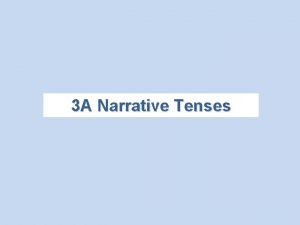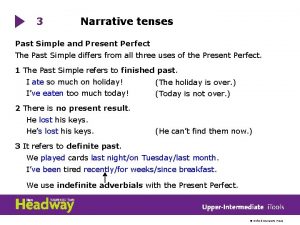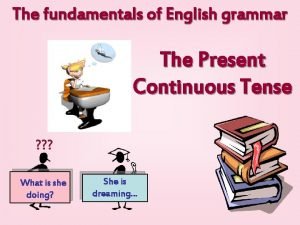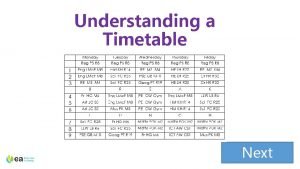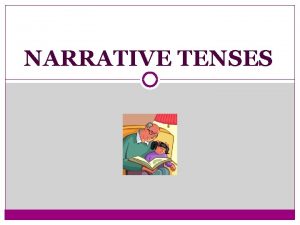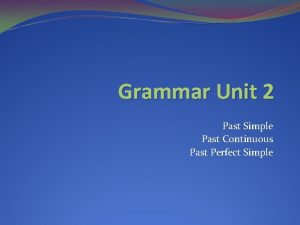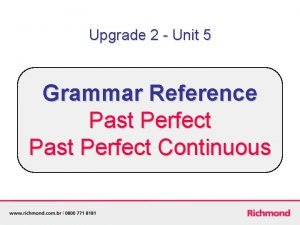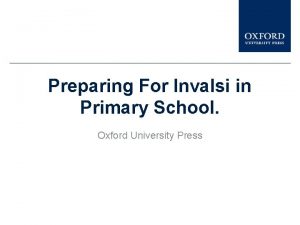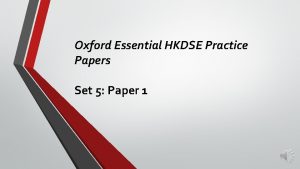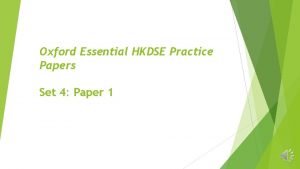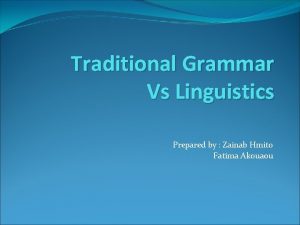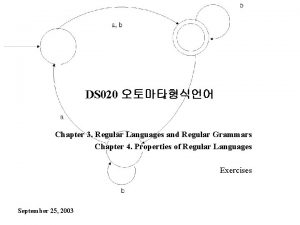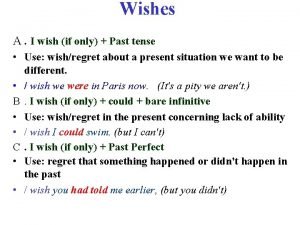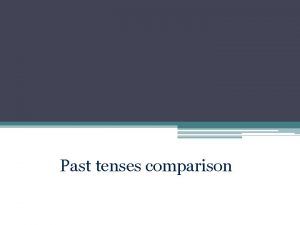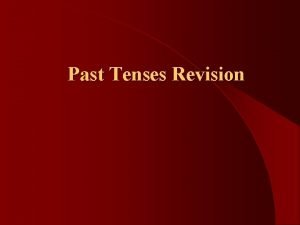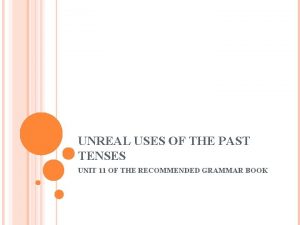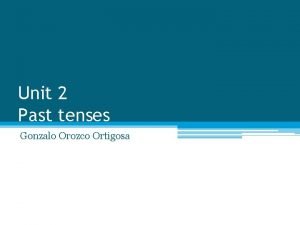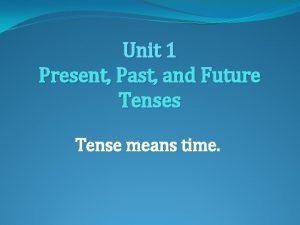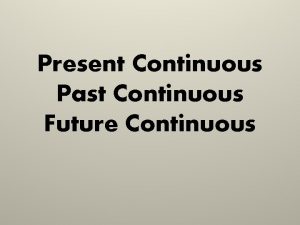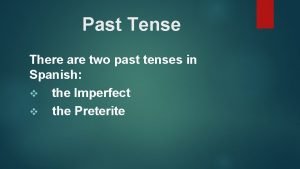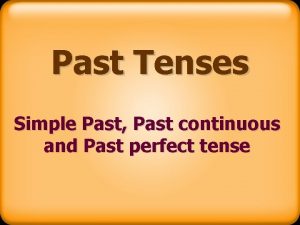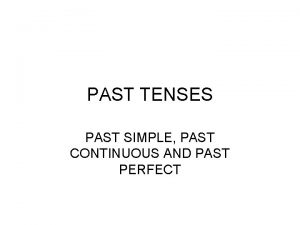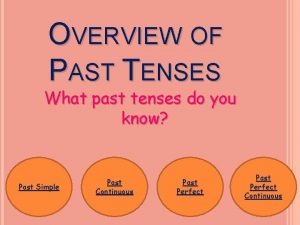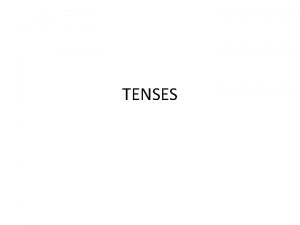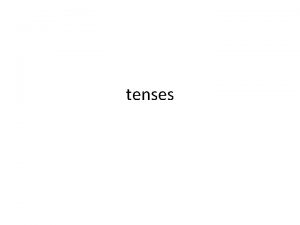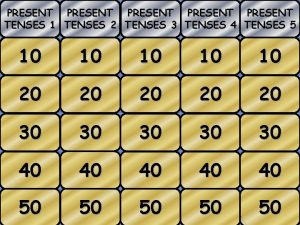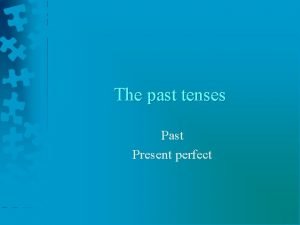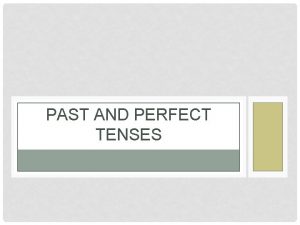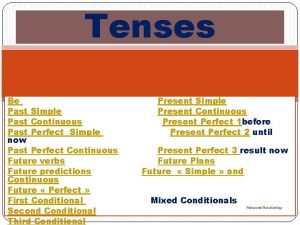Grammar from Oxford Past tenses For ECCElevel practice































- Slides: 31

Grammar from Oxford Past tenses For ECCE-level practice see Oxford Practice Grammar Intermediate

Find examples of past tense forms “There’s a little fishing village where we used to spend our vacations when I was little. The cottage had a lovely view of the sea. My brother and I would get up early every morning and run down to the harbor to watch the fishermen unloading their catch. They were always very busy. Often, one fishing boat was going out while another one was coming in. We stopped going there when we grew older, but I still think about it from time to time. ” For ECCE-level practice see Oxford Practice Grammar

Examples of past tense forms “There’s a little fishing village where we used to spend our vacations when I was little. The cottage had a lovely view of the sea. My brother and I would get up early every morning and run down to the harbor to watch the fishermen unloading their catch. They were always very busy. Often, one fishing boat was going out while another one was coming in. We stopped going there when we grew older, but I still think about it from time to time. ” For ECCE-level practice see Oxford Practice Grammar

past simple: form (regular verbs) • Affirmative: • Negative: • Questions: infinitive + -ed did not (didn’t) + infinitive without to Did + subject + infinitive without to Spelling rules for affirmative • Infinitive ending -e: add ___. • Infinitive ending consonant + vowel + consonant: _______ and add -ed. • Infinitive ending consonant + -y: ________ and add -ed. For ECCE-level practice see Oxford Practice Grammar

past simple: form (regular verbs) • Affirmative: • Negative: • Questions: infinitive + -ed Did not (didn’t) + infinitive without to Did + subject + infinitive without to Spelling rules for affirmative • Infinitive ending -e: add -d. • Infinitive ending consonant + vowel + consonant: double the final consonant and add -ed. • Infinitive ending consonant + -y: change the -y to an -i and add -ed. For ECCE-level practice see Oxford Practice Grammar

past simple: form (irregular verbs) Negatives and questions are formed in the same way as for regular verbs. In the affirmative, many forms are irregular and must be learned individually, e. g. , go > went, buy > bought. What did you do over the weekend? I went to the movies, but I didn’t see a film. I met a friend and we went for coffee. For ECCE-level practice see Oxford Practice Grammar

past simple: use • to talk about past states or completed actions, often with a past-time expression such as last • to talk about past habits or routines, often with an adverb of frequency “Did you eat all that pizza? ” “He walked five miles every day. ” For ECCE-level practice see Oxford Practice Grammar

used to and would are followed by infinitive without to. • both can be used to describe repeated past actions and routines, in a similar way to the past simple When I was younger, people used to / would knit all their own sweaters. Now most people buy them. For ECCE-level practice see Oxford Practice Grammar

used to and would “My mother used to be an actress. She gave it up when she married my dad. ” “Grandpa was very superstitious. He would never open an umbrella indoors. ” • used to emphasizes a routine that no longer takes place • would describes typical past behavior Used to ______ can describe situations and states in the past. We can’t use _____ in this way. would For ECCE-level practice see Oxford Practice Grammar

past continuous: form • Affirmative: • Negative: • Questions: Was / were + -ing Was / were + not (wasn’t / weren’t) + -ing Was / were + subject + -ing Where were you going when I saw you earlier? I wasn’t going anywhere nice. I was visiting a friend in the hospital. For ECCE-level practice see Oxford Practice Grammar

past continuous: use • to talk about a continuous past situation in progress at a particular time in the past • to talk about a background to a second situation or event (when the past simple is used in parallel). “At two o’clock today, I was having lunch with Molly. ” “We weren’t sitting by the window when it broke. ” “While I was waiting for you, I finished the crossword puzzle. ” while • We can use as, when and _______ to introduce a longer background action. For ECCE-level practice see Oxford Practice Grammar

past continuous and past simple: use • two past simple verbs can be used to refer to one action that follows another Compare: “John looked at me when I called his name. ” (= John looked after I called him. ) “John was looking at at me when I called his name. ” (= John started looking before I called him. ) • The ______ past continuous is not used with stative verbs such as be or know. For ECCE-level practice see Oxford Practice Grammar

Correct or incorrect? • Sarah was listening to some loud music when I got in. I could hear it from the next street! • As I was waiting for my interview, I got more and more nervous. • When we lived near the sea, we went swimming every day. • My parents would be in a band together, but that was a long time ago. O O For ECCE-level practice see Oxford Practice Grammar

Corrected • As I was waiting for my interview, I got more and more nervous. • My parents were in a band together, but that was a long time ago. For ECCE-level practice see Oxford Practice Grammar

Find examples of perfect tense forms “I’ve been in my current job for nearly five years. That’s really a long time at this company. They tend to give you long-service awards if you’ve been working here for as little as ten years! Things have changed a lot since my grandfather’s day. By the time he retired, he’d been working for the same company forty years and had never felt the need to look for other employment that entire time. ” For ECCE-level practice see Oxford Practice Grammar

Examples of perfect tense forms “I’ve been in my current job for nearly five years. That’s really a long time at this company. They tend to give you long-service awards if you’ve been working here for as little as ten years! Things have changed a lot since my grandfather’s day. By the time he retired, he’d been working for the same company forty years and had never felt the need to look for other employment that entire time. ” For ECCE-level practice see Oxford Practice Grammar

present perfect simple: form • Affirmative: • Negative: • Questions: Have / has (‘ve / ‘s) + past participle Have / has + not (haven’t / hasn’t) + past participle Have / has + subject + past participle • The past participle form of regular verbs is often the same as the past simple form. Irregular forms must be learned seen eaten individually, e. g. , see > saw > ______ , eat > ate > ______. For ECCE-level practice see Oxford Practice Grammar

present perfect simple: use • to talk about past actions or states that have a result in the present, or which have happened recently Someone’s broken the vase. For ECCE-level practice see Oxford Practice Grammar

present perfect simple: use • to talk about life experiences, often with ever or never Have you ever done bungee jumping? No, I’ve never wanted to do that. I’ve tried paragliding though. For ECCE-level practice see Oxford Practice Grammar

present perfect simple: use • with since or for, to describe a period of time that has passed “I’ve had this computer since last year. ” “We haven’t lived in this town for very long. ” since for • We use ______ + a period of time and ______ + a specific point in time. For ECCE-level practice see Oxford Practice Grammar

present perfect and past simple • for can be used after the past simple or present perfect simple; since is not used after the past simple • ago is used with the past simple “He lived in France for a few years in the 1990 s. ” “He lived in France a few years ago. ” NOT “He lived in France since 2008. ” For ECCE-level practice see Oxford Practice Grammar

present perfect and past simple With the present perfect simple, we can use: • “unfinished” time expressions such as so far, and until now • other time expressions such as still, already, and yet For ECCE-level practice see Oxford Practice Grammar

present perfect continuous: form • Affirmative: • Negative: • Questions: Have / has (‘ve / ‘s) been + ing form Have / has (‘ve / ‘s) not been + ing form Have / has + subject + been + ing form I’ve been washing dishes all morning, and I’m still not finished! For ECCE-level practice see Oxford Practice Grammar

present perfect continuous: use • to talk about an action that started in the past and continues up to the present • to give a reason for a present situation • with for and since to talk about how long something has been happening for “The situation has been getting worse, and shows no signs of improvement. ” “I’m cold because I’ve been working in the basement. ” “It has been snowing for ten hours / since last night. ” For ECCE-level practice see Oxford Practice Grammar

Correct or incorrect? • After our argument, Tina didn’t speak to me for ages. dollars towards my new bike so far. I only • I saved 250 need another $50. • She has been working here since just before Thanksgiving, 2005. He didn’t change much • I saw Paul Taylor recently. since we last saw him. O O For ECCE-level practice see Oxford Practice Grammar

Corrected. • I have saved 250 dollars towards my new bike so far. I only need another $50. • I saw Paul Taylor recently. He hasn’t changed much since we last saw him. For ECCE-level practice see Oxford Practice Grammar

past perfect simple: form • Affirmative: • Negative: • Questions: No, we’d always thought this was such a safe area. There hadn’t been any burglaries before this happened. Had (‘d) + past participle Had not (hadn’t) + past participle Had + subject + past participle Had you seen or heard anything suspicious before the night in question? For ECCE-level practice see Oxford Practice Grammar

past perfect simple: use • to talk about an earlier past, before another time period or action • after verbs of thinking and saying • with expressions such as when, as soon as, by the time “She was worried because Jo hadn’t called all day. ” “He realized that he had forgotten to pack his pajamas. ” “By the time I had finished reviewing everything, it was midnight. ” For ECCE-level practice see Oxford Practice Grammar

past perfect continuous: form • Affirmative: • Negative: • Questions: Had (‘d) + been + -ing Had not (hadn’t) + been + -ing Had + subject + been + -ing I was at school when I suddenly felt dizzy and fainted. In fact, I hadn’t been feeling very well earlier because I’d been playing volleyball morning. For ECCE-level practice see Oxford Practice Grammar

past perfect continuous: use • to describe a past action occurring before something else happened • to explain a past situation by describing what was happening beforehand “Last week, Tim returned from Madrid, where he had been studying Spanish. ” “Ryan’s mother wasn’t pleased that he had been playing football in the mud and rain. ” • Remember that we can’t use stative verbs such as continuous form. be and know with a _____ For ECCE-level practice see Oxford Practice Grammar

Select the correct sentence A I’m sick of paint! I’ve decorated the living room all morning. B I’m sick of paint! I’ve been decorating the living room all morning. A Leo started his novel in May last year, and by the time we met next, he had been writing it. B Leo started his novel in May last year, and by the time we met next, he had written it. For ECCE-level practice see Oxford Practice Grammar
 Narrative tenses past continuous
Narrative tenses past continuous Narrative tenses
Narrative tenses Past simple y past perfect ejemplos
Past simple y past perfect ejemplos V present
V present What simple tenses are the fundamentals of english grammar
What simple tenses are the fundamentals of english grammar Korean verbs conjugation
Korean verbs conjugation Eva büyüksimkeşyan
Eva büyüksimkeşyan English grammar in use oxford
English grammar in use oxford Unit 2 past forms
Unit 2 past forms Uso del pasado simple en ingles
Uso del pasado simple en ingles Past perfect simple
Past perfect simple Narrative tenses used to and would
Narrative tenses used to and would Oxford invalsi primo grado
Oxford invalsi primo grado Oxford essential hkdse practice papers answer key
Oxford essential hkdse practice papers answer key Oxford essential hkdse practice papers answer
Oxford essential hkdse practice papers answer Oopt test practice free
Oopt test practice free Left linear grammar example
Left linear grammar example Weaknesses of traditional grammar
Weaknesses of traditional grammar Chomsky hierarchy of grammars
Chomsky hierarchy of grammars Closure properties of regular languages
Closure properties of regular languages Wish with past tense
Wish with past tense Tenses comparison
Tenses comparison Decir past tense
Decir past tense Past continuous engleski
Past continuous engleski Unreal uses of past tenses
Unreal uses of past tenses Estructura del present continuous
Estructura del present continuous Past tense of float
Past tense of float Continuous future in the past
Continuous future in the past Keywords of simple past tense
Keywords of simple past tense Past tenses in italian
Past tenses in italian Four past tenses
Four past tenses Two past tenses in spanish
Two past tenses in spanish
